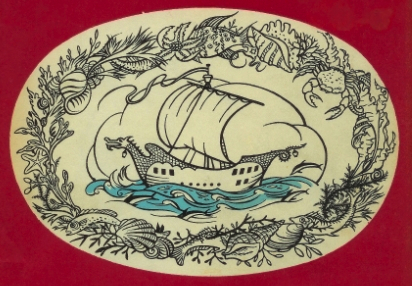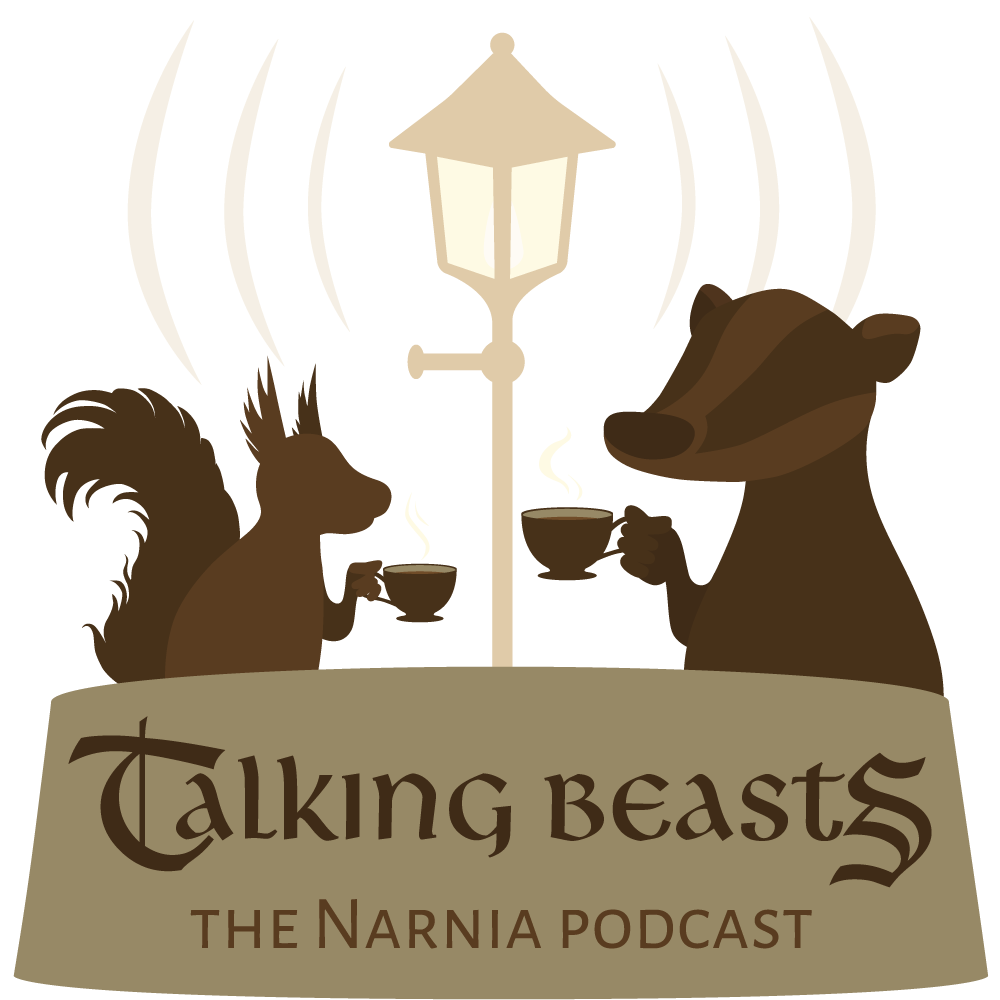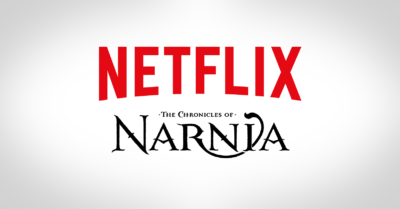Podcast #99: The End of the World (Book Commentary)
 The Voyage of the Dawn Treader, part 7
The Voyage of the Dawn Treader, part 7
Rilian and Glumpuddle have finally reached the end of the world and concluded their commentary on ‘The Voyage of the Dawn Treader.’ Listen to their discussion on four of the strangest chapters in The Chronicles of Narnia. Three books down, four to go!
Merry Christmas, NarniaWebbers! Long live the true king!
Chapters discussed:
13. The Three Sleepers (2:30)
14. The Beginning of the End of the World (16:31)
15. The Wonders of the Last Sea (22:18)
16. The Very End of the World (26:33)
RT 48:25
Podcast: Play in new window | Embed






This may have been your best podcast. All your podcasts are very good, but this one was even better. I have many favorite characters from Narnia, but Lucy is my number one character. The bomb that Aslan drops on Lucy by saying that she will never come back to me is very disturbing. Your explanation really resonated with me. This is a major point of the series. Could you write this up and post it? Excellent analysis.
You mentioned that Aslan was in Charn (of course). Maybe the Wood in the Middle is part of Aslan's Country.
I am looking forward to your series about SC. Silver Chair is one of my favorite books. I see the adaption of the book into a movie as being fairly straight forward. I would compress the back story and put it first. I would have the look of the school, Aslan's Country and Narnia be different so the viewer could keep track of the different places. I would have Aslan's Country be a view of the earth from 70,000 feet where the sky is black. The moors should be filmed in Ireland or Scotland. I have many more ideas about how to make this movie, but I will spare you. I ask that, please, stay with the book. It is a great book.
Prince Caspian's desire to stay reminds me of Rilian in the the Silver Chair. He was also rebuked for wanting to seeking private adventures rather than take his responsibility as king of Narnia.
“If we find ourselves with a desire that nothing in this world can satisfy, the most probable explanation is that we were made for another world.” Lewis
“There is but one good; that is God. Everything else is good when it looks to Him and bad when it turns from Him.”
Lewis
In terms of the desire for another world, I really think you will always misunderstand what Lewis was saying unless you understand that Jesus was ultimately the answer to his own quest for that other world and, as you hinted at, the model for Aslan.
I think one of the reasons why there are so many things in Narnia that seem like things you couldn't just make up is because of how heavily Lewis drew on ancient and (esp.) medieval literature. For example, I read Dante's Paradiso a couple years back and there's a scene in it that is similar to a scene in Dawn Treader. As Dante moves further through Paradise, the light becomes brighter and brighter, but Dante's eyes also get stronger and stronger, so he doesn't mind it… just like the sun at the World's End in Dawn Treader.
Merry Christmas!
About why Lewis put the knife at the Aslan's Table. Like you guys said in the Podcast, Aslan's Table is a place of rest. It is a place where the weary can rest and those who are weak or broken (like Rhoop) can find strength and/or peace. In our lives here on our world, where can we find true rest and peace and strength? At the foot of the cross. Yet, the cross was the torture device, it was the thing that Jesus Christ died on. Yet, for us it has become a symbol of hope and love. In the same way, the knife that killed Aslan would need to be on the table that gives rest to the weary and refuge to travelers. And thus the three sleepers were put to sleep because an item as precious as the knife that killed Aslan, should not be used for violence. Like he does with all evil things, Aslan has taken something evil and cruel, and turned it into a symbol of hope and love.
On Caspian's speech:Maybe so, i mean i can understand the feeling that he has when he believes on this wonderful journey growing unconditionally, He by no means wants to continue and we see that even though he is a king and his subjects tell him it's his unbreakable duty to return, but not forward. His temper flares, i can see a kind of parallel whenever we sin and God and his kind of gives us a scolding like Aslan and rebukes explaining to us gently that what some of the decisions we make are wrong. I'm just theorizing though.
Thanks for the comment. I think we will have lots of thoughts come to our minds regarding how the film should be made. We will try to keep it to the book though. Obviously if it was a "How the film should be made" discussion, it would make the podcast more redundant for later episodes.
If anyone knows a fan mail address for Georgie Henley please please let me know.
Great podcast. I was kind of disappointed that Ramandu, the retired star, did not appear in person in the movie, though his beautiful daughter was in it. They named Ramandu's island in the movie, but they would not include him as a character. It's a mystery to me.
Really good podcast, looking forward to Silverchair which is my favourite book.
Interesting to hear about the differnt versions of the book. Fenris Ulf(Fenrisulven in Swedish) is a pretty scary wolf in Norse mythology.
Happy New Year 2014!
Always love listening to the Podcasts! Can't wait for Silver chair commentary.
–Benjamin
This feels like old home week for me… I'm so grateful you guys are still so faithful to the books and keep exploring the stories. These are our histories. In a way, we are Narnians, and we have experienced the stories on so deep a level, we have grown up there. Keep exploring, keep learning, and keep sharing your findings!
Love the discussion of Aslan's character toward the end. It really helped me put into thoughts something I've long felt about the character (and the Chronicles as a whole). Whenever I heard people refer the books as "allegorical" it spurred my argumentative side, as did references to Aslan being "symbolic". It may sound odd, but I feel those terms cheapen the books badly. Allegories are notoriously shallow and preachy. J.R.R. Tolkien said, "I cordially dislike allegory in all its manifestations, and always have done so since I grew old and wary enough to detect its presence. I much prefer history – true or feigned– with its varied applicability to the thought and experience of readers. I think that many confuse applicability with allegory, but the one resides in the freedom of the reader, and the other in the purposed domination of the author."
It is sad to me that Lewis gets accused of allegory when it seems to me that 'applicability' is one of his strongest traits as an author. Aslan is a fictional character that is not symbolic of anything. He IS something. He IS Christ, if you will. His death on the Sone Table is not allegory for Jesus's death on the cross. It is much more powerful than any allegory could be because of character, plot, and everything else that makes a novel. Lewis puts so much meat into these books, and it is there for us to find it if we look, but he never bludgeons us with his art.
Sorry if this was unclear and I hope no one misunderstands me. I may have put my feelings into thought, but apperantly I need some work on putting my thoughts into words.
I loved what was said about how it is sometimes fairy tales and fiction which illustrate truths and how people feel. The podcast is terrific and I am looking forward to the Silver Chair. But are there plans to do the other three books as well?
At some point, yes we would like to cover all the books! SC movie news will probably distract us for a while. Thanks for your comment. 🙂